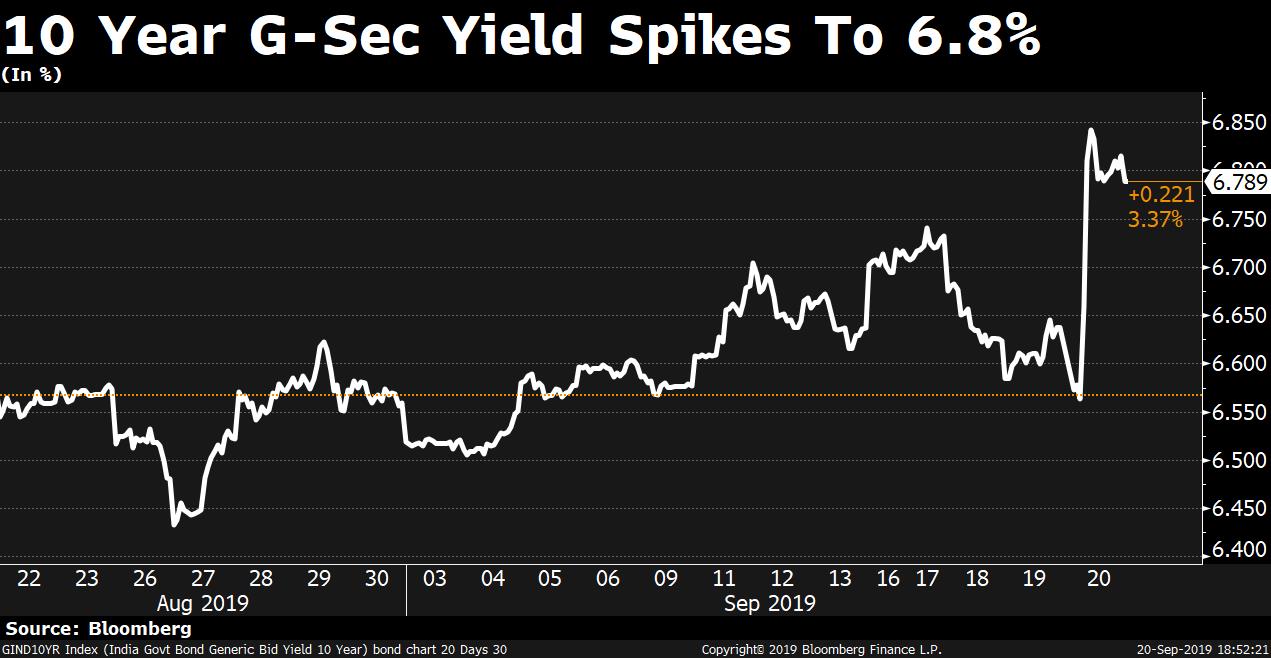
The Indian government is likely to run a fiscal deficit higher than the 3.3 percent of GDP target announced in Union Budget 2019-20, after it proposed to cut corporate tax rates.
As part of a continuum of measures being announced to revive the Indian economy, Finance Minister Nirmala Sitharaman on Friday said that domestic companies will have the option to pay income tax at 22 percent if they don't avail any exemptions or incentives from 2019-20.
“Revenue foregone for the reduction in corporate tax rate is Rs 1.45 lakh crore per annum,” Sitharaman said. However, the economic buoyancy brought about from the reduction of these rates will make up for the loss in revenue, Sitharaman said. Also, when tax rates are reduced it is a given that the tax basket expands, she added.
The Fiscal Math
According to Union Budget documents, the fiscal deficit in actual terms was pegged at Rs 7.04 lakh crore. The revenue foregone will push up this number to Rs 8.48 lakh crore, assuming all components of government revenue and expenditure remain unchanged.
This fiscal deficit of Rs 8.48 lakh crore works out to 3.97 percent of India's GDP, using the nominal GDP assumptions made in the Union Budget.
To be sure, the final fiscal deficit will be influenced by any higher-than-expected increase in tax collections, lower spending or a pick-up in asset sales.
“We are conscious of the impact this will have on the fiscal deficit; (we are) not oblivious of the development,” said Sitharaman during her press conference.
The government, however, did not provide any clarity on what it expects the fiscal deficit to settle at in FY20 or the roadmap that will be followed to bring it back towards the stated goal of 3 percent under the Fiscal Responsibility and Budget Management Act, 2003.
Speaking to BloombergQuint, Ashima Goyal, member of the Prime Minister's Advisory Council, said that the Government remains committed to fiscal consolidation and may cut expenditure to balance the impact of the tax cuts.
Goyal said the she doesn't expect the government to exceed the 0.5 percent of GDP room provided by the NK Singh review committee as an ‘escape clause' in times of stress.
I don't think there will be much slippage in the fiscal deficit. This government has been very committed to following the FRBM roadmap. So they may, if required, cut expenditure like they did last year. We will also have to wait for the Finance commission. It's possible that they may ease requirements. Even the existing FRBM Act allows a 0.5 percent relaxation if there is major tax change or in case of a growth slowdown.Ashima Goyal, Member, PMEAC
Still, the fiscal consolidation road map will likely have to be redrawn.
“It is likely that one will see a change in the fiscal glide path,” said Sameer Narang, chief economist at Bank of Baroda. “The impact of the stimulus is very large roughly at about 0.7 percent of GDP,” he added.
Some positive externality is expected which is likely to have its own impact as well. The fiscal push will have a positive impact on sentiment and help in revenue generation.Sameer Narang, Chief Economist, Bank of Baroda
“While the recently announced measures will have obvious fiscal implications, the current downturn is an exception to previously seen trends and calls for unconventional policy measures,” said Rupa Rege Nitsure, chief economist at L&T Financial Services Ltd.
She, however, cautioned that weak consumer demand could limit the impact of the announced measures. “The current downturn is a combination of an investment and demand slowdown and if consumption remains muted, companies will have limited incentive to invest despite the tax cuts,” she said.
Bond Yields Surge
Bond markets, which have been jittery about the government's ambitious tax collection targets, reacted negatively to the news, while equity markets surged.
The benchmark 10-year bond yield surged 18 basis points and closed at 6.79 percent on Friday. The jump in bond yields is the highest one-day surge seen since February 2017, shows Bloomberg data.
A wider fiscal deficit will mean a greater supply of government bonds and the Centre will need to step up borrowing to fund its fiscal deficit. It will also complicate monetary policy by further reducing the transmission of interest rate cuts via the bond market as supply-demand pressures will balance out lower policy rates.
The announcement comes just a day after Reserve Bank of India Governor Shaktikanta Das said that the government has little fiscal room to provide direct support to the Indian economy and is currently focusing on taking steps to improve ease of doing business and reducing structural bottlenecks in the economy.

Essential Business Intelligence, Continuous LIVE TV, Sharp Market Insights, Practical Personal Finance Advice and Latest Stories — On NDTV Profit.























